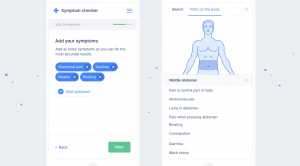Infermedica is an AI-driven health-tech platform that can effectively make sure that those who need to see a doctor in-person do, and those who don’t are directed to other forms of treatment such as telemedicine or self-care. Founded in 2012, we’re a Polish startup dedicated to making healthcare more accessible. Put simply, we create tools for patients to advise them where to go when they’re feeling unwell and need help.
We have created white labelled pre-diagnosis and triage solutions, like symptom checkers, and recently raised $10m Series A to improve diagnosis and access to primary care.
Many healthcare systems are overrun and costly, and a huge number of people don’t even have access to basic care. These are all problems Infermedica seeks to solve. Healthcare providers and insurance specialists across our network benefit from the reduction of patients with minor issues that can be self-treated seeking medical assistance, increasing efficiency and reducing costs for all involved, while also making care more accessible.
We work with major B2B healthcare and insurance partners, including Microsoft, Allianz, Global Excel, Sana Kliniken and Médis, across 30 countries. Our platform has completed more than six million health checks to date.

How did you come up with the idea for the company?
I used to be a games developer and I was a big fan of an online version of the game 20 Questions. I found it fascinating how the AI system learnt after each interaction with the player, meaning it got better and better with each round. One evening, I was playing the game with a friend who happened to be a doctor, and I started to wonder if the same process could be applied to healthcare, in particular, symptom checking.
Traditionally, symptom checking has involved the use of static decision trees, a decision flow chart that takes the user down a specific path decided via the answers before. Arguably the most well-known example is the Schmitt-Thompson Protocols which are widely used across North America and accepted as the standard for telephone triage care. The challenge is that they don’t always take into account complex risks and further context, so they often provide misleading or incorrect answers. Similarly, many people take to the internet to research what their symptoms may mean and ‘Dr. Google’ can be just as problematic, generating worry for symptoms that often don’t warrant it.
Using my previous experience in software development, we developed an AI engine to solve this problem. The AI technology forms the basis of our symptom checker products, it’s constantly learning and developing; taking information from the health checks it carries out, alongside a supporting database of medical content that is consistently bolsted from data derived from trusted medical journals and recommendations from agencies such as the WHO. Just as the 20 questions game got stronger with each round, this added intelligence is used by the AI system to inform future treatment recommendations.
More from Interviews
- Meet Jaron Soh, Co-founder & CEO of LGBTQIA+ Mental Wellness App: Voda
- Meet Nathalie Morrison: The Founder Behind Astrea, the Fashion-Tech Brand Putting Lab-Grown Diamonds at the Heart of Luxury
- Meet Badr Ward, CEO And Founder Of Education Platform: Lamsa
- A Conversation with Andrej Persolja, Founder of We Fix Boring
- A Chat with Kebbie Sebastian, CEO and Founder of Merge
- Meet Dr Agnès Leroy, GPU Director at Cryptography Tool: Zama
- Meet Roman Eloshvili, Founder of ComplyControl
- Inside Mobile Payments with Bojoko’s Ville Saari
How has the need for Infermedica evolved during the pandemic?
The closure of doctors offices and the cancellation of routine appointments meant that many had to rely on telemedicine or digital medicine services to access primary care before seeing a doctor.
Our AI-driven platform was able to direct patients to the most appropriate level of care, reducing the number of patients who would’ve visited the doctors’ office as the first step. Sometimes it’s better for a patient to visit a pharmacy or simply rest up instead of seeing a doctor. Preventing people from unnecessarily visiting a physician when they don’t need to was really important during the pandemic – it provided them with more time to treat those with serious illnesses.
Additionally, we developed a specific ‘COVID-19 Risk Assessment’ tool in three weeks to aid with symptom checking. It has since been used by over half a million people.
What can we hope to see from Infermedica in the future?
We’re seeing major growth in the US and Germany currently and our recent funding will be used to support this journey and further enhance R+D to improve patient triage. These AI technologies will also support clinical decision analysis by interpreting lab tests and assisting differential diagnoses.
Working across these different regions will provide even more data which will build a detailed feedback loop that will help us reach our goal of building an FDA approved chatbot.
Looking further ahead, AI will streamline patient care even further by actually issuing basic health instructions – such as prescribing common drugs – further alleviating the pressure on healthcare providers and doctors.



